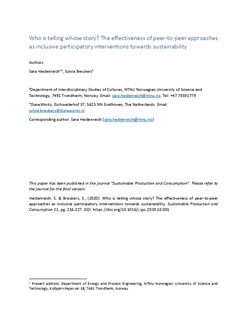| dc.contributor.author | Heidenreich, Sara | |
| dc.contributor.author | Breukers, Sylvia | |
| dc.date.accessioned | 2020-02-19T07:53:23Z | |
| dc.date.available | 2020-02-19T07:53:23Z | |
| dc.date.created | 2019-10-18T13:04:19Z | |
| dc.date.issued | 2019 | |
| dc.identifier.citation | Sustainable Production and Consumption. 2019, 21 216-227. | nb_NO |
| dc.identifier.issn | 2352-5509 | |
| dc.identifier.uri | http://hdl.handle.net/11250/2642441 | |
| dc.description.abstract | Peer-to-peer approaches refer to a participatory style of teaching and learning, which increasingly gain popularity as inclusive and participatory interventions to encourage changes towards more sustainable energy practices. However, this prominence has not been matched by evidence on the effectiveness of such approaches. By investigating the design and implementation of the peer-to-peer project useITsmartly, which centred on the topic of energy efficient and sustainable ICT use, this paper focuses on the effectiveness of this peer-to-peer approach as inclusive participatory intervention. Drawing on the environmental justice literature, it addresses particularly the second-level effectiveness, that is the impact peer-to-peer exercises have on the peer educators themselves in terms of capacity building and empowerment. The paper evaluates the preparation, recruitment, training and multiplication phases of the approach and concludes that it is essential to invest enough time and resources to truly recognize the peer educators and their lifestyles and practices, and enable them to participate in the peer education on their own terms. If not, lack of motivation and skills of the peer educators as well as too much focus on quantitative targets may compromise the actual purpose of the peer-to-peer approach and turn it into a top-down exercise. | nb_NO |
| dc.language.iso | eng | nb_NO |
| dc.publisher | Elsevier | nb_NO |
| dc.rights | Attribution-NonCommercial-NoDerivatives 4.0 Internasjonal | * |
| dc.rights.uri | http://creativecommons.org/licenses/by-nc-nd/4.0/deed.no | * |
| dc.title | Who is telling whose story? The effectiveness of peer-to-peer approaches as inclusive participatory interventions towards sustainability | nb_NO |
| dc.type | Journal article | nb_NO |
| dc.type | Peer reviewed | nb_NO |
| dc.description.version | acceptedVersion | nb_NO |
| dc.source.pagenumber | 216-227 | nb_NO |
| dc.source.volume | 21 | nb_NO |
| dc.source.journal | Sustainable Production and Consumption | nb_NO |
| dc.identifier.doi | 10.1016/j.spc.2019.10.001 | |
| dc.identifier.cristin | 1738409 | |
| dc.description.localcode | © 2019. This is the authors’ accepted and refereed manuscript to the article. Locked until 8 October 2021 due to copyright restrictions. This manuscript version is made available under the CC-BY-NC-ND 4.0 license http://creativecommons.org/licenses/by-nc-nd/4.0/ | nb_NO |
| cristin.unitcode | 194,62,40,0 | |
| cristin.unitname | Institutt for tverrfaglige kulturstudier | |
| cristin.ispublished | true | |
| cristin.fulltext | postprint | |
| cristin.qualitycode | 1 | |

